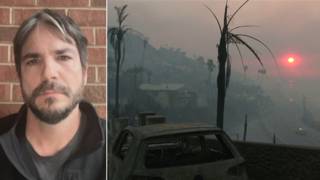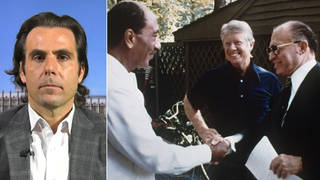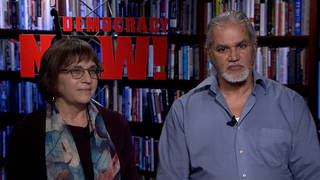
Related
Guests
- Victoria Tauli-CorpuzIndigenous Peoples’ Network.
The Philippines has arrested at least one suspect in a weekend bombing that killed 10 people and wounded dozens of others. The bomb exploded outside a crowded market in the town of Koronadal on the southern island of Mindanao Saturday. The attack left carnage and destruction in its wake. Body parts were strewn across toppled vendors, a bloodied and maimed body hung off the back of a motorcycle cab, and shattered glass and debris were everywhere.
The attack follows a breakdown in peace talks between the government and a Muslim rebel group, the Moro Islamic Liberation Front. The government immediately blamed the group, but an MILF spokesman told Reuters it had nothing to do with the bombing.
Others blamed Abu Sayyaf, a Muslim rebel group the U.S. has linked to al-Qaeda.
At least 80 people have died in attacks since March, and the oil rich island of Mindanao has been the site of some of the worst violence.
We hear from Filipino activist Victoria Tauli-Corpuz of the Indigenous Peoples’ Network.
Transcript
AMY GOODMAN: Last week, we were joined by Victoria Tauli-Corpuz. She is with the International Forum on Globalization based in the Philippines, also with the organization the Indigenous Peoples’ International Center for Policy Research, which is based in the Philippines. She came to the studio to speak about issues of globalization and war, along with Martin Khor and John Cavanagh of the Institute for Policy Studies. Afterwards, they went over to the United Nations to talk about globalization and then gave speeches at night, continuing their series of people’s teach-ins around the world around issues of globalization. Victoria [Tauli-Corpuz].
VICTORIA TAULI-CORPUZ: Framework to create rules or laws in our own countries. And in the Philippines, we now have a law called the Indigenous Peoples’ Rights Act, which is patterned to this draft declaration. And now we are using this law to tell the government that even if they have agreed, for instance, to WTO agreements which will allow our government to bring in corporations to our communities so that they could exploit the resources there, we say that you have the Indigenous Peoples’ Rights Act, which is supposed to protect our rights to our ancestral lands and also to protect our rights to self-determination, which means our right to determine how development should take place in our communities and our right to determine how we can govern ourselves and how we can use our customary laws to protect ourselves and to live harmoniously together. So, we were able to use these laws to protect our lands and our resources. And now many Indigenous peoples in other parts of the world are also using it, trying to get this law to also work in changing their laws in their own countries so that they will have those kinds of possibilities. So, the work that’s happening globally is brought back to the local — to the national level, and we use it to protect our rights even in the local communities. And hopefully, we will be able to replicate these kinds of actions in different parts of the world.
And beyond that, we also thought that we should participate in the U.N., for instance, the World Summit on Sustainable Development, because even if these are just processes which are not really coming up, you know, with treaties or conventions, they can still develop frameworks which can support our struggles as Indigenous people. So we did participate in the WSSD. And in this process, we brought all the different Indigenous peoples in different parts of the world. We came together in a summit, which we called the Kimberley Summit, because it was held in Kimberley in South Africa, which is the — actually, it’s the ancestral domain of the Khoisans. You know, these are the Indigenous peoples of South Africa, who were there even before the other peoples came in. And in here, we formulated our own Indigenous peoples’ plan for sustainable development, which is now recognized at least in the U.N. in their — now the U.N. is meeting in the Commission on Sustainable Development. And in their report, they recognize that this is the plan that Indigenous peoples have come up with, through their own processes, and the U.N. should be able to support this kind of implementation plan.
So, these are just a few of the things that we have been doing to emphasize that we have the alternatives. The communities where we are living are already alternatives by themselves. And what is needed is for the international community to reinforce and strengthen the possibilities for these communities to exist, and also the national governments to also recognize that in a country there are really diverse peoples and diverse systems that should be allowed to flourish and to develop further. And this is one of the principles that was highlighted in our book, The Alternatives to Globalization, the principle of cultural diversity. And it’s really one of the key principles that we keep on pushing even in the different arenas, even in the WTO, because we think that
in a country it’s not as if you just have one single kind of people or one ethnic group; you really have multiethnic or pluri — in Latin America, they call pluriethnic societies, which is composed of different peoples, and they have different systems that are coexisting together. And what globalization has done is it wants to destroy these diverse systems and create a system which follows their dominant development model. And if that is what they are wanting to do, then, by all means, we should resist that and assert our right to be diverse and to be different and to maintain diverse economics and production systems and also diverse cultural systems.
And I think by us pushing that, by Indigenous peoples bringing this whole principle into all the different negotiating arenas, we are having some results in terms of even changing some of the the laws or challenging some of the existing rules that are already there. For instance, in the WTO, the TRIPS Agreement, which Martin mentioned earlier, we are challenging the TRIPS Agreement by saying that this does not protect the traditional knowledge that we have, the traditional systems that we have to protect our own knowledge or intellectual property, and therefore, it should not be used, and it should not be used in our own communities. And now we’re in the process of formulating and bringing into the table what are the alternative forms of protecting traditional knowledge, that are not — that are even contradictory to what the TRIPS says. And we would like these kinds of formulations to come in into these different agreements, whether these are being developed by the World Trade Organization, the intellectual property rights organization, or even other bodies like the Convention on Biological Diversity.
So, these are the efforts that the Indigenous peoples have been doing in a very sustained manner. And it’s something that we always wanted to do in a global level, but make sure that it comes back into the local communities and it’s used as a tool by the communities to strengthen further their rights for self-determination. And by doing that, we are able to provide also a model of how to strengthen these movements and also how to replicate these kinds of models in different parts of the world.
So, I would just like to end by saying that the Indigenous peoples have been coming together in these different gatherings and are now, more than ever, convinced that we really have something to share to the world. We have something to share in terms of shaping a world that we would like our children to live in the future and our grandchildren to live in the future. And this, the possibilities for us to be able to defend these communities, the possibilities for us to be able to come into the global arena and talk about these developments, these systems that we have in our communities, should be strengthened and allowed, so that the world maybe can learn from what we have to share, what we have had saved through centuries. And hopefully, some elements of what we are doing can be emulated or replicated by other communities.
And I think the moves now for localization, the moves for coming up with sustainable consumption and production systems, many of the — one of the things that we did, for instance, in Kyoto during the World Water Forum was to bring case studies of traditional water management systems that Indigenous peoples are using up 'til now. And, in fact, one case was the case in our — in my town, where we presented how we are managing the water system, whether for irrigation purposes or drinking purposes, which we are still practicing up ’til now in spite of the fact that the government wanted this to be changed. You know, because of the World Bank conditionalities through the National Irrigation Administration, they wanted to change this whole system. We persisted that this shouldn't be changed, and this should remain as a practice. And so it’s still very vibrant. It’s still being done. And we presented this in Kyoto during the World Water Forum. And we were surprised that all the other Indigenous peoples, whether from Bolivia or from Ecuador, who came also presented these kinds of practices. And as a result of that, the UNESCO, for instance, is saying that these are the kinds of things that we should, in fact, write about and push for. And we are encouraging now the U.N. to put this as viable practices and to put this as examples of why the privatization of water resources should not be allowed, especially in communities where these kinds of practices are being done yet. So, I think in spite of the gloom and the pessimism that we can see prevailing because of what is happening now, many of the experiences and the examples that we can see in Indigenous peoples’ communities, I think, are —
AMY GOODMAN: And you’ve been listening to Victoria [Tauli-Corpuz]. She is with the International Forum on Globalization from the Philippines, recently in New York giving an address, one of the many teach-ins that the IFG does around the country.
If you’d like to get a copy of today’s program, you can call 1-800-881-2359. That’s 1-800-881-2359. Democracy Now! is produced by Kris Abrams, Mike Burke, Angie Karran, Sharif Abdel Kouddous, Ana Nogueira, Elizabeth Press, with help from Noah Reibel and Vilka Tzouras. Mike Di Filippo is our engineer, with Rich Kim. Our website, democracynow.org. You can email us at mail@democracynow.org. I’m Amy Goodman, with Juan González. Thanks for listening.
[end of Hour 1]
AMY GOODMAN: From Pacifica Radio, this is Democracy Now!
ARUNDHATI ROY: Democracy, the modern world’s holy cow, is in crisis. And the crisis is a profound one. Every kind of outrage is being committed in the name of democracy. It’s become little more than a hollow word, a pretty shell, emptied of all content or meaning. It can be whatever you want it to be. Democracy is the Free World’s whore, willing to dress up, dress down, willing to satisfy a whole range of kinky tastes, available to be used and abused at will.
AMY GOODMAN: Today, the hour with Arundhati Roy in our firehouse studio.
All that and more, coming up.
Welcome to Democracy Now!, The War and Peace Report. I’m Amy Goodman.
Doctors in Iraq fear that hundreds of Iraqis may be suffering from radiation poisoning following the widespread looting of the country’s nuclear facilities, this according to the London Telegraph. Many residents in villages close to the huge Tuwaitha nuclear facility about seven miles south of Baghdad are showing signs of radiation sickness, including rashes, acute vomiting and severe nosebleeds. Alarmed by the reports, the International Atomic Energy Agency last week sent a letter to reiterate earlier demands that the U.S. grant the agency access to Iraq’s nuclear sites, but so far there has been no response.
In a major overhaul of leadership in Iraq, most of Washington’s top civil administrators in Baghdad are being sent home. Retired Lieutenant General Jay Garner is expected to leave within the next two weeks. Barbara Bodine, who has been in charge of reconstruction of the Baghdad region, will be leaving within the next day or two. Others expected to leave soon include Margaret Tutwiler, in charge of overall communications; Tim Carney, who had been overseeing Iraq’s Ministry of Industry and Minerals; David Dunford, a senior Foreign Service specialist on the Middle East; and John Limbert, the ambassador to Mauritania. This all comes as State Department veteran Paul Bremer arrived in Basra today to become the new top administrator in charge of rebuilding Iraq. He’s formerly with Kissinger Associates.
The BBC reports Iraqis have become increasingly frustrated that their lives remain in chaos more than a month after Saddam Hussein’s regime was toppled. Several Baghdad neighborhoods still lack electricity and running water. Rubbish is piled up in the streets. And many shopkeepers are reportedly too afraid of looters to reopen their businesses. There is a lack of security. Ministries are not working properly, and salaries are not being paid.
We turn now to Sharif Abdel Kouddous, correspondent for Democracy Now! in Baghdad.
SHARIF ABDEL KOUDDOUS: The situation in Baghdad over the last few days seems to have grown more and more tense. The looting and violence continues. There are buildings on fire around the city. And at night, you can hear the crackle of gunfire and emergency. Carjackings are very common. The day before yesterday, one of my colleagues was in a car about a few hundred meters down the street from the Sheraton Hotel where we are staying. He watched as five men, two of them armed with pistols, swarmed around the car and directly in front of him. He saw one man point his gun inside the driver’s seat window and fire six shots at the driver. This was at about 2:30 p.m. and happened only a couple of streets down from where a U.S. Army tank and a few soldiers were stationed. So it seems no place is safe in the city. Also yesterday, the telephone exchange building on Rasheed Street was on fire. This was at about 1:00 in the afternoon. I rushed over there after seeing —
AMY GOODMAN: And that was the report of Sharif Abdel Kouddous, Democracy Now! producer, in Baghdad. As you could hear, his report cut off in the middle.
Well, more news from Iraq. A new report by the U.N.'s Food and Agriculture Organization says Iraq's agricultural system is on the brink of collapse, raising fears that many of Iraq’s 24 million people will go hungry this summer. According to the London Observer, government warehouses that would have served as the main suppliers of seeds, fertilizers and pesticide sprays have been looted, particularly in the center and south of the country.
The group directing all known U.S. search efforts for weapons of mass destruction in Iraq is winding down operations, planning to head home, after finding no proof that President Saddam Hussein kept clandestine stocks of outlawed arms, this according to a report in The Washington Post.
And this news: U.S. Secretary of State General Colin Powell warned today that the emergence of an Islamist government in Iraq would, quote, “not be in the best interest of the Iraqi people or its neighbors.” Powell made the comments as he emerged from a meeting with Egyptian President Hosni Mubarak. Powell is on a tour of the region in an effort to revive the Palestinian-Israeli peace process.
Ayatollah Mohammad Baqir al-Hakim, the most prominent leader among Iraq’s majority Shia Muslims, has crossed into Iraq for the first time after 23 years of exile. He told an ecstatic rally of over 100,000 people in Basra that Iraq must have a totally independent government.
The Bush administration took a step toward developing a new generation of nuclear weapons Friday when the Senate Armed Services Committee approved a bill that would lift a 10-year ban on researching small atomic bombs. The bill also provides $15.5 million in funding for research on a large hydrogen bunker buster bomb called the Robust Nuclear Earth Penetrator, a bomb which would be at least six times more powerful than the atomic bomb dropped on Hiroshima.
Secretary of State Colin Powell said Israel must ease restrictions and hardships on Palestinians in the Occupied Territories. The comments were made during a joint news conference with Palestine’s new Prime Minister Mahmoud Abbas, also known as Abu Mazen. Powell is in the Middle East to promote support for the U.S.-backed Middle East peace. But Powell left Israel without gaining any firm commitment from Israel to the plan. Meanwhile, the Israeli army reimposed a full closure of the Gaza Strip late yesterday, because of “security considerations,” it said, less than 24 hours after lifting restrictions to coincide with Powell’s visit.
On Friday, Israeli troops raided the offices of the International Solidarity Movement. Two international activists were arrested and will be deported. A Palestinian was also arrested. Over the weekend, at least one Israeli and three Palestinians were killed in the Occupied Territories. Foreigners are being forbidden from approaching security walls near Jewish settlements and from entering parts of Rafah, which the Israeli army considers to be a military zone. More than 20 Israeli army jeeps surrounded the ISM offices in the West Bank before soldiers broke into the building, confiscating computers and documents. The two international activists expected to be deported are 28-year-old Christine Razowsky of Chicago and Australian Miranda Sissons, who works for the New York-based Human Rights Watch. Twenty-two-year-old Palestinian Fida Gharib was also arrested.
The raid came just hours after the Israeli military announced it would begin requiring foreigners entering the Gaza Strip to sign waivers absolving the Israeli army from any responsibility if the army shoots them. Visitors must also declare they are not peace activists and not connected to the International Solidarity Movement.
In recent months, several members of the International Solidarity Movement group have been killed or seriously wounded during Israeli incursions into the Occupied Territories. In March, an Israeli bulldozer crushed Rachel Corrie, the 23-year-old student from Olympia, Washington, when she tried to prevent it from demolishing Palestinian homes. Last month, the Israeli army shot an unarmed British peace activist from the group in the head. Twenty-one-year-old Tom Hurndall remains in critical condition. Twenty-four-year-old Brian Avery was shot in the face. He, too, remains in critical condition. The British government has also demanded an investigation into the shooting death of British cameraman James Miller, who was shot by the Israeli military last week while shooting a documentary for HBO on the effects of violence on Palestinian children.
And this news just in from Chechnya: At least 30 people have been killed today, dozens more injured, after a trailer loaded with explosives rammed into a government building. The BBC reports the attack in the northern town of Znamenskoye is being blamed on Chechen rebels who are fighting for independence from Moscow.
International monitors have left Indonesia’s western province of Aceh ahead of a possible military attack against rebels. The Indonesian government has demanded the Free Aceh movement abandon their independence campaign, lay down their arms and start talks on local autonomy. Six hundred more Indonesian troops are expected to arrive in Aceh shortly to join thousands of soldiers already in the province. The Indonesian military has killed thousands of Acehnese over the last years.
Here in this country, Michael Powell, son of General Colin Powell, Michael Powell, chair of the Federal Communications Commission, is expected to propose an increase in the U.S. television cap to 45% when he presents a draft of new media ownership rules to his fellow commissioners on Monday, this according to the Financial Times. The existing cap prevents one company from reaching more than 35% of the U.S. national television audience. Increasing the cap would allow large television networks to buy more local stations. It would also eliminate the need for Viacom, which owns CBS, and Rupert Murdoch’s Fox to divest stations because they currently are in breach of the cap. On June 2nd, the FCC’s five commissioners will vote on Powell’s proposals.
And this news from London: Clare Short resigned this morning from Tony Blair’s Cabinet. The international development secretary accused Blair of breaching assurances that he made to her about the need for a legitimate Iraqi government organized under U.N. mandate.
The FBI investigators now suspect the anthrax-filled letters sent to politicians and media figures in 2001 may have been prepared underwater using equipment investigators have discovered in a Maryland pond, this according to The Washington Post. The find represents the first physical evidence to surface in the case, and it strengthens the growing belief that the attacks were carried out by someone with possible links to the U.S. bioweapons establishment. The pond, on the outskirts of Washington, is eight miles from Fort Detrick, the headquarters of the Army Medical Research Institute of Infectious Diseases. No suspects have been named so far in the investigation, but Attorney General John Ashcroft has named Dr. Steven Hatfill as a, quote, “person of interest” in the inquiry. The Washington Post noted Hatfill is a former Fort Detrick employee on bioterrorism. He also had a postgraduate diploma in diving and underwater medicine from a South African naval training institute. He trained in South Africa under apartheid. Hatfill has vigorously denied any involvement and has accused the FBI of ruining his life by leaking its suspicions to the press.
[break]
AMY GOODMAN: Sara Thomsen sent in this song, “Is It for Freedom?” Each time we play it, people call in from around the country to try to find out where it’s from. We know nothing more about it, except that it was recorded for us. Sara Thomsen, wherever you are, let us know how people can get a copy of “Is It for Freedom?” This is Democracy Now!'s War and Peace Report. I'm Amy Goodman, with Juan González.
JUAN GONZÁLEZ: And good day to all of our listeners and viewers across the country. And, Amy, the Bush administration, apparently, a month into the occupation, has conducted its first purge of its own civilian administrators. But, of course, no one in our media here in the United States is calling it a purge, as Baghdad continues and Iraq continues to fall into chaos and anarchy seems to prevail. And yet, the Germans and the French kept warning the Bush administration this was precisely what would happen if they unleashed this war against Iraq, and now it’s turning out to be so.
And at the same time, we’ve got Michael Powell over here in the United States. Friday, we discussed how Michael Powell had yet to tell his own commissioners on the FCC what his plans were for deregulation and concentration of the media. He apparently must have heard us in Washington on Friday, because over the weekend he decided he is going to release his plans to his his commissioners today. But, of course, there’s more than just a 35% cap involved. You’re talking about the total consolidation, unprecedented consolidation, of the U.S. media that’s about to occur. And interestingly, I had mentioned previously, our organization, the National Association of Hispanic Journalists, had called for a halt to these decisions. We were joined recently by the National Association of Black Journalists, the California Chicano News Media Association and National Association of Lesbian and Gay Journalists. But most of the other journalism organizations in America are being silenced over the massive transformation of the American media that is about to occur on June 2nd.












Media Options